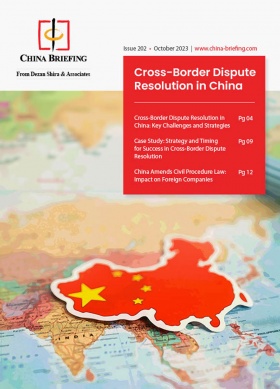Hong Kong Budget 2024-2025 – Government Implements New Tax Arrangements and Extends Funding Schemes
Hong Kong has released its annual Budget for the financial year 2024 to 2025, introducing a range of new tax and support policies for individuals and businesses. The measures include extensions to funding schemes for small and medium-sized enterprises, extensions on a subsidy scheme for electric vehicles, and a salaries tax reduction for individuals. Meanwhile, the government will introduce a two-tier salaries tax system to increase taxes on high earners, among other new arrangements designed to raise public funds.
On February 28, 2024, the Financial Secretary of Hong Kong, Paul Chan, announced the Special Administrative Region’s (SAR) government budget for the fiscal year 2024 to 2025 (“2024-25 Budget”). The 2024-25 Budget outlines the government’s planned revenue and expenditure for the upcoming fiscal year and includes details such as projected government revenue from taxes, fees, and other sources, as well as planned expenditures on various sectors like healthcare, education, infrastructure, and social welfare.
Hong Kong’s Economy in 2023 at a Glance
- GDP: +3.2%
- Private consumption expenditure: +7.3%
- Investment expenditure: +10.8%
- Total trade: HK$8.82 trillion (US$112.65 billion); – 6.7
- Total value of exports: -7.8%
- Total value of imports: -5.7%
- Export of services: +21.2%
- Unemployment rate: 2.9%
- Inflation rate: 1.7%
Source: Hong Kong Census and Statistics Department
Overview of the 2024-25 Hong Kong Budget
Under the 2024-25 Budget, total government expenditure is set to rise by 6.7 percent to HK$776.9 billion (US$99.23 billion) and reach a 24.6 percent ratio to nominal GDP. Recurrent expenditure will increase by 7 percent to HK$580.2 billion (US$74.1 billion), with a focus on essential areas like health, social welfare, and education. Non-recurrent expenditure, meanwhile, is expected to decrease substantially by 47.7 percent to HK$33.6 billion (US$4.29 billion) owing to lower spending requirements in the post-pandemic era.
Meanwhile, total government revenue is estimated at HK$633 billion (US$80.85 billion), with notable increases in earnings and profits tax, revenue from land premium, and stamp duty. Due to a bond issuance of HK$120 billion (US$15.33 billion) in the 2024-25 fiscal year, Hong Kong’s budget deficit is expected to reach HK$48.1 billion (US$6.14 billion), which means fiscal reserves are expected to decrease to HK$685.1 billion (US$87.5 billion).
Measures to support Hong Kong residents and enterprises
The 2024-25 Budget introduces a variety of support measures for Hong Kong residents and companies.
The support measures include rate concessions for both domestic and non-domestic properties in the first quarter of the 2024-25 fiscal year. This concession, capped at HK$1,000 (US$127.73) per rateable property, is estimated to benefit approximately 3.08 million domestic properties and 430,000 non-domestic properties, resulting in a reduction of government revenue by HK$2.6 billion (US$332 million) and HK$370 million (US$47.26 million), respectively.
Additionally, there will be a 100 percent reduction in salaries tax and tax under personal assessment for the 2023 to 2024 year of assessment, with a ceiling of HK$3,000 (US$383.18). This reduction will be reflected in the final tax payable for the year, benefiting around 2.06 million taxpayers and reducing government revenue by HK$5.1 billion (US$651.4 million).
Similarly, profits tax for the 2023 to 2024 assessment year will see a 100 percent reduction, also capped at HK$3,000. This measure will benefit approximately 160,000 businesses and reduce government revenue by HK$430 million (US$54.92 million).
Moreover, eligible social security recipients will receive an allowance equal to one-half of a month of the standard rate of Comprehensive Social Security Assistance (CSSA) payments, Old Age Allowance, Old Age Living Allowance, or Disability Allowance. Similar arrangements will apply to recipients of the Working Family Allowance, incurring an additional expenditure of about HK$3 billion (US$383.18 million).
Furthermore, all demand-side management measures for residential properties, including Special Stamp Duty (SSD), Buyer’s Stamp Duty (BSD), or Double Stamp Duty (DSD), have been canceled with immediate effect.
Measures to support small and medium-sized enterprises
The 2024-25 Budget expands upon a range of incentive schemes and preferential tax policies aimed at supporting small and medium-sized enterprises (SMEs).
Among them is the introduction of two enhancement measures for the deduction of expenses under profits tax. Under this policy, tax deductions will be granted for expenses incurred in reinstating leased premises to their original condition, and the time limit for claiming allowances for industrial and commercial buildings and structures will be removed, allowing new owners to claim allowances after a change of ownership. These measures will take effect from the year of assessment 2024 to 2025.
Meanwhile, the 2024-35 Budget expands incentive schemes aimed at SMEs. Hong Kong has a wide range of government funding schemes available to various types of companies to help them in fields, such as marketing, R&D, technological and digital upgrading, sales, and talent acquisition and cultivation.
The new expansions to these schemes include the following:
- An extension of the SME Financing Guarantee Scheme, a loan matching scheme carried out by the Hong Kong Mortgage Corporation Limited Insurance Limited (“HKMCI”) to help SMEs and non-listed companies receive financing from approved participating lenders to meet business needs. Under the updated scheme, the application period for the 80 percent and 90 percent Guarantee Products under the SME Financing Guarantee Scheme, which were set to expire at the end of March 2024, will be extended for two years until the end of March 2026. Additionally, the total guaranteed commitment under the scheme will increase by HK$10 billion (US$1.28 billion).
- Digital transformation support for SMEs in the food and beverage and retail industries: SMEs in these industries will have access to basic digital solutions through the Digital Transformation Support Pilot Programme. Subsidies will be provided on a matching basis for implementing digital solutions, focusing on areas such as digital payment, online promotion, and customer management.
- Enhancement of the Dedicated Fund on Branding, Upgrading, and Domestic Sales (BUD Fund), a fund originally set up to help Hong Kong-based companies seize opportunities in the Chinese mainland, but which has now expanded to all countries that have signed an Investment Promotion and Protection Agreement (IPPA) or Free Trade Agreement (FTA) with Hong Kong. The BUD Fund will receive a HK$500 million (US$63.86 million) injection to help SMEs enhance competitiveness and expand into the Chinese mainland and overseas markets. This includes support for e-commerce projects through the “E-commerce Easy” initiative.
Measures to support green industries
The 2024-25 Budget extends a range of incentives and support schemes for supporting the development of green industries.
For instance, the 2024-25 Budget extends and adjusts the First Registration Tax (FRT) Concessions arrangement for electric vehicles (EVs). The FRT Concession scheme was first introduced in 2018 to encourage car owners to swap in their combustion engine cars for EVs by providing rebates on FRT.
The FRT concessions for EVs will be extended for another two years, previously set to expire at the end of March 2024. However, concessions will also be reduced by 40 percent due to price reductions and increased availability of vehicle options.
Between April 2024 and March 2026, the FRT concession cap for eligible private cars will be reduced from HK$97,500 to HK$58,500, while for private car owners eligible for the “One-for-One Replacement” (OfO) Scheme, the FRT concession will be reduced from HK$287,500 to HK$172,500. Meanwhile, eligible private cars with a vehicle price before tax of over HK$500,000 (US$63,863) will no longer be eligible for FRT concessions. However, the FRT for other types of EVs (such as electric commercial vehicles, electric motorcycles, and electric motor tricycles) will be waived in full.
In addition to the FRT Concessions scheme, the 2024-25 Budget also extends the Green and Sustainable Finance Grant Scheme. This scheme, aimed at supporting green and sustainable debt instruments, will be extended to 2027. The scope of subsidies will be expanded to cover transition bonds and loans, encouraging regional industries to utilize Hong Kong’s transition financing platform as they move towards decarbonization.
Meanwhile, to promote sustainable financing, the Financial Services and the Treasury Bureau and the Securities & Futures Commission (SFC) are tasked with developing a roadmap and vision statement to assist companies and financial institutions in sustainability reporting and data analysis. Enterprises will therefore be required to align their sustainability disclosure practices with international standards.
The 2024-25 Budget also announced that the government will launch the Green and Sustainable Fintech Proof-of-Concept Subsidy Scheme. This scheme, set to launch in the first half of the year, will provide funding for early-stage green fintech initiatives, facilitating their commercialization and fostering new developments in green fintech.
Finally, the Marine Department plans to provide incentives for Hong Kong-registered ships that achieve high ratings under international standards on decarbonization. Additionally, a feasibility study is underway to provide green-methanol bunkering for local and ocean-going vessels, with an action plan expected to be published this year.
Tax adjustments to raise public funds
The Budget 2024-25 will implement a new two-tiered tax rate regime for salaries and personal assessment tax from the 2024 to 2025 assessment year onward. This aims to boost public revenue by increasing taxes on high earners while avoiding placing additional tax burdens on the majority of people and damaging the low-tax regime for which Hong Kong is known.
Under the two-tiered system, taxpayers with net income exceeding HK$5 million (US$638,630) would see a 16 percent standard rate applied to the portion exceeding HK$5 million. This would affect around 12,000 taxpayers, boosting government revenue by approximately HK$910 million (US$116.23 million) annually. Under the previous system, the rate was capped at 15 percent.
Meanwhile, the government will also introduce a progressive rating system for domestic properties from the first quarter of 2025 onward. Property rates are taxes levied on property owners in Hong Kong, with the current rate set at 5 percent of the rateable value of the property. The Hong Kong Rating and Evaluation Department states that the new rating system will raise rates to 8 percent on the rateable value of between HK$550,000 (US$70,249) and HK$800,000 (US$102,180), and to 12 percent on properties on the rateable value exceeding HK$800,000.
The 2024-25 Budget estimates that the hike will contribute around HK$840 million annually to government revenue from the fourth quarter of 2024-25 onwards.
Business registration fees will also increase by HK$200 (US$25.55) to HK$2,200 (US$281) per year with effect from April 1, 2022, which is expected to generate approximately HK$295 million (US$37.68 million) in additional annual revenue. A two-year waiver of the business registration levy of HK$150 (US$19.16) payable to the Protection of Wages on Insolvency Fund will be implemented to mitigate the impact on businesses.
Finally, the government also proposes the resumption of the Hotel Accommodation Tax (HAT) collection at a 3 percent rate from January 2025 onward. This is expected to increase government revenue by about HK$1.1 billion (US$140.5 million) annually. This collected HAT is estimated to account for less than 1 percent of the total spending of overnight visitors in Hong Kong. Additionally, the government plans to allocate over HK$1 billion (US$127.73 million) for upgrading tourism infrastructure and services to attract more high-spending overnight visitors in the coming year.
About Us
China Briefing is written and produced by Dezan Shira & Associates. The practice assists foreign investors into China and has done so since 1992 through offices in Beijing, Tianjin, Dalian, Qingdao, Shanghai, Hangzhou, Ningbo, Suzhou, Guangzhou, Dongguan, Zhongshan, Shenzhen, and Hong Kong. Please contact the firm for assistance in China at china@dezshira.com.
Dezan Shira & Associates also has offices in Vietnam, Indonesia, Singapore, United States, Australia, Germany, Italy, India, and Dubai (UAE). We also have partner firms assisting foreign investors in The Philippines, Malaysia, Thailand, Bangladesh.
- Previous Article Navigating the Impact of OpenAI’s Sora on China’s AI Industry
- Next Article China’s “24 Measures” to Attract Foreign Investment: Progress Report








